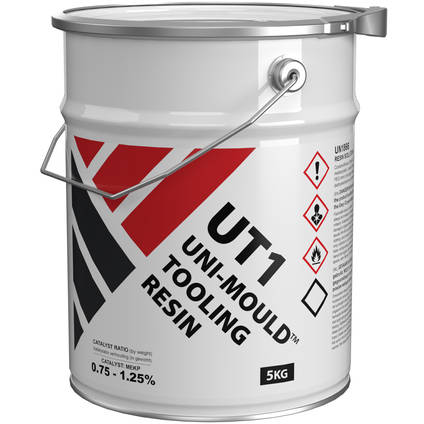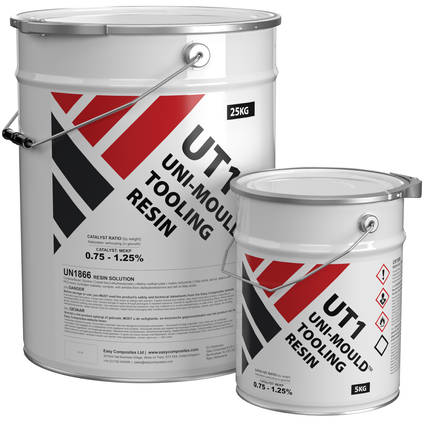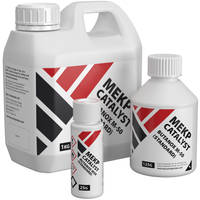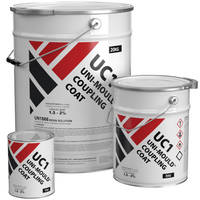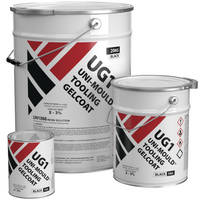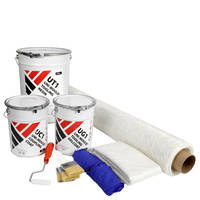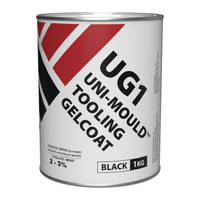Need any help or advice?+44 (0)1782 454499
Downloads (3)
This is a chemical product. Before storage or use you must download and read the accompanying safety and technical datasheets.
| Safety Datasheet (SDS) - EN | ||
| Safety Datasheet (SDS) - NL | ||
| Technical Datasheet (TDS) |
Specification
Product Data
| Colour | Beige | |
|---|---|---|
| Chemistry / Material | Polyester | |
| Viscosity | 1600 | mPa.s |
| Flexibility | Hard / Rigid |
Cured Mechanical Properties
| Max Service Temp | 90 | °C |
|---|---|---|
| Hardness | 70 (Hard) | Shore D |
| Tensile Strength | 100 | MPa |
| Flexural Strength | 141.3 | MPa |
| Elongation at Break | 7.08 | % |
Pot Life and Cure Times
| Pot Life (Typical) | 35 | mins |
|---|---|---|
| Initial Cure Time | 24 | Hrs |
| Full Cure Time | 7 | Days |
General Properties
| Gross Weight | 5.25 | kg |
|---|
Shipping Information
Restrictions
In the currently selected pack size, this product is classed as dangerous goods in limited quantity for the purposes of transport.
Shipping is possible to all UK addresses, including the Channel Islands, without restriction. However, due to being classed as 'dangerous goods', delivery times are not guaranteed on any delivery service.
Shipping to EU countries is now done through our European subsidiary based in the Netherlands. All EU customers should use www.easycomposites.eu.
To check availability of shipping to any other country, add the item to your basket and use the shipping calculator on the basket page.
For a full information regarding the shipment of dangerous goods to all destinations, see our delivery information page.
Package Size
There are no package size restrictions or surcharges for this product.
Delivery Cost
To find the availability and cost for delivery of this item to your address, add it to your basket and then use the instant shipping calculator on the basket page.
UT1 Uni-Mould Tooling Resin
- UT1-5
Hazardous
- 5/5 Average rating
UT1 Uni-Mould Tooling Resin is a low shrinkage filled polyester laminating for composite moulds and tools. Its special filled composition is designed for use a rapid tooling system where all the mould reinforcement is laminated at the same time, making mould production significantly quicker compared to a conventional laminating resin.
This special filled tooling resin should be used as part of the Uni-Mould rapid tooling system.
Requires MEKP catalyst, not included. Available to buy online in 5kg and 25kg tins.
PRODUCT VERSIONS
Pack Size
AVAILABILITY:19 in stock available for immediate shipping
51 more can built in 2-3 days
Optional items
PRODUCT OPTIONSTrade discounts
| 0-4 | 5+ |
|---|---|
| £34.90 | £31.00 |
We won’t be beaten on price!
If you believe you’re buying an equivalent product cheaper elsewhere, contact us to discuss your requirements.
UT1 Uni-Mould Tooling Resin is part of the Uni-Mould™ universal mould making system and should be used in conjunction with Uni-Mould Tooling Gel Coat and Uni-Mould Coupling Coat to produce hard-wearing, polishable moulds of any size with zero shrinkage suitable for use in just about any composites process.
For full details on the Uni-Mould system, read our Uni-Mould Introduction and Application Guide.
Requires MEKP catalyst (not included)
Suggested Purchasing Quantities
Use the table below to help you purchase suitable quantities of the resins and glass for a given mould size.
| UT1 Uni-Mould Resin | Chopped Strand Mat | ||||
|---|---|---|---|---|---|
| The table is NOT an exact guide to the ratios of the materials but is rounded up to the nearest purchasable pack size or weight of mat. | |||||
| Mould Area | Tooling Gel | Coupling Coat | Tooling Resin | 100g | 450g |
| 0.6sqm | 1kg | 1kg | 5kg | 2sqm | 2kg |
| 3.5sqm | 5kg | 5kg | 25kg | 7sqm | 7kg |
| 13sqm | 10kg | 25kg | 100kg | 26sqm | 25kg |
Further Information
Application
The laminating technique for the UT1 Uni-Mould Tooling Resin is quite different from conventional polyester tooling resin or laminating resins and it is essential that you familiarise yourself with this technique and follow the guidelines carefully in order for the resin to cure properly and result in a successful mould.
UT1 Uni-Mould Tooling Resin is cured by its own exotherm and must reach a temperature of 50-60°C during its cure in order to achieve its full properties. In order for this to happen your workshop environment needs to be between 18°C and 25°C and you must lay down a minimum of 4 layers of 450gsm or resin-rich (4:1) CSM onto the back of the mould in a single session.
Preparation
In order to ensure that all the reinforcement can be laid down in a single session it is important to prepare the resin and reinforcement in advance before starting to laminate.
Cut your 450gsm CSM to the right shapes for your mould, allowing for a minimum of 4 layers of mat. Once you have cut the mat, weigh it to see how much CSM you will be using.
Next, weigh out 4 times the weight of the glass in resin (UT1 Uni-Mould Tooling Resin should be used at a typical 4:1 ratio or resin to glass) which means if you are using 5kgs of CSM to reinforce your mould you should prepare 20kgs of resin.
Begin Laminating
When you are ready, catalyse the resin using MEKP catalyst (not included) at 0.75 - 1.25% (depending on the ambient temperature) and mix thoroughly.
Working quickly, apply resin all over the mould and then add layers of glass one at a time, wetting with plenty of resin (4:1 by weight) until you have added all the layers of glass to the back of the mould. You should use the last of the prepared resin as you add the last layer of CSM.
As the laminate starts to cure the temperature will rise to 50-60°C and the colour of the laminate will change from a mid brown to a light brown colour.
Allow the resin to cure fully for 24hrs.
Use with Prepregs
Although it is possible to use Uni-Mould moulds with out-of-autoclave (oven cure) prepregs (such as XPREG® XC110) we no longer recommend Uni-Mould moulds for this purpose.
Instead – for prepreg use – better results will be achieved using high temperature epoxy moulds made using our EG160 / EMP160 tooling system or XPREG® XT135 Tooling Prepreg. These high temperature epoxy tooling systems allow the prepreg to be cured at the optimum 120°C which reduces the cure time and improves the mechanical properties of the component. Additionally, epoxy tools have been found to result in a better surface finish with prepregs such as XPREG® XC110.
Compatibility Information - Dos and Don'ts
Although by no means an exhaustive list, the mould materials, pigments and additives listed below have all been tested and are known to work well with UT1.
Compatible Patterns
- Uni-Mould Mould System
- UC1 Uni-Mould Coupling Coat
- Polypropylene and polyethylene sheet
- Most Woods (eg. stiffening battens in mould laminate/edge)
Compatible Release Agents
- Chemical Release Agents (such as Easy-Lease)
- Mould Release Wax (such as Miracle Gloss #8 Wax)
Compatible Additives
- No filling necessary.
Key Processing Information
- Ease of Use: Suitable for professional and hobby use (follow SDS advice).
- Odour: Tooling Resin has a strong styrene based odour.
- Safety Precautions: Wear gloves and goggles and work in a well ventilated area. Always read the SDS before use.
- Ambient Conditions: Can be used from 15 to 30°C although pot-life and cure time will be affected significantly. Recommended working at an ambient of 20-25°C.
- Degassing: Not necessary. Simply mix and use.
- Mix Ratio: Add MEKP Catalyst at a ratio of 0.75 - 1.25% dependent on ambient temperature. Use digital scales.
- Mixing: Mix thoroughly by hand for at around 2 minutes.
- Application: Can be applied by brush and plastic finned roller
- Pot-Life: >The pot life at 20°C is 35 minutes. Be sure to use your resin before this time.
- Exotherm (Over-Heating): Resin will heat-up whilst it cures. Mix in small batches and use expediently. Mixed resin in a pot will quickly overheat (exotherm) and can smoke/ignite. Never leave mixed resin unattended.
- Maximum Service Temperature: When fully cured and post cured, the maximum Service Temperature of Uni-Mould moulds is 90°C
- Cure Time/Demould: At 20°C the demould time is 24hours.
- Overcoating: Where thicker moulds are desired, you can overcoat the tooling resin 1 Hr 30 Mins after the first layers have "whitened" and exothermed.
- Shelf Life: Uni-Mould tooling Resin has a shelf-life of 4 months.
Trade discounts
| 0-4 | 5+ |
|---|---|
| £34.90 | £31.00 |
We won’t be beaten on price!
If you believe you’re buying an equivalent product cheaper elsewhere, contact us to discuss your requirements.
UT1 Uni-Mould Tooling Resin is part of the Uni-Mould™ universal mould making system and should be used in conjunction with Uni-Mould Tooling Gel Coat and Uni-Mould Coupling Coat to produce hard-wearing, polishable moulds of any size with zero shrinkage suitable for use in just about any composites process.
For full details on the Uni-Mould system, read our Uni-Mould Introduction and Application Guide.
Requires MEKP catalyst (not included)
Suggested Purchasing Quantities
Use the table below to help you purchase suitable quantities of the resins and glass for a given mould size.
| UT1 Uni-Mould Resin | Chopped Strand Mat | ||||
|---|---|---|---|---|---|
| The table is NOT an exact guide to the ratios of the materials but is rounded up to the nearest purchasable pack size or weight of mat. | |||||
| Mould Area | Tooling Gel | Coupling Coat | Tooling Resin | 100g | 450g |
| 0.6sqm | 1kg | 1kg | 5kg | 2sqm | 2kg |
| 3.5sqm | 5kg | 5kg | 25kg | 7sqm | 7kg |
| 13sqm | 10kg | 25kg | 100kg | 26sqm | 25kg |
Further Information
Application
The laminating technique for the UT1 Uni-Mould Tooling Resin is quite different from conventional polyester tooling resin or laminating resins and it is essential that you familiarise yourself with this technique and follow the guidelines carefully in order for the resin to cure properly and result in a successful mould.
UT1 Uni-Mould Tooling Resin is cured by its own exotherm and must reach a temperature of 50-60°C during its cure in order to achieve its full properties. In order for this to happen your workshop environment needs to be between 18°C and 25°C and you must lay down a minimum of 4 layers of 450gsm or resin-rich (4:1) CSM onto the back of the mould in a single session.
Preparation
In order to ensure that all the reinforcement can be laid down in a single session it is important to prepare the resin and reinforcement in advance before starting to laminate.
Cut your 450gsm CSM to the right shapes for your mould, allowing for a minimum of 4 layers of mat. Once you have cut the mat, weigh it to see how much CSM you will be using.
Next, weigh out 4 times the weight of the glass in resin (UT1 Uni-Mould Tooling Resin should be used at a typical 4:1 ratio or resin to glass) which means if you are using 5kgs of CSM to reinforce your mould you should prepare 20kgs of resin.
Begin Laminating
When you are ready, catalyse the resin using MEKP catalyst (not included) at 0.75 - 1.25% (depending on the ambient temperature) and mix thoroughly.
Working quickly, apply resin all over the mould and then add layers of glass one at a time, wetting with plenty of resin (4:1 by weight) until you have added all the layers of glass to the back of the mould. You should use the last of the prepared resin as you add the last layer of CSM.
As the laminate starts to cure the temperature will rise to 50-60°C and the colour of the laminate will change from a mid brown to a light brown colour.
Allow the resin to cure fully for 24hrs.
Use with Prepregs
Although it is possible to use Uni-Mould moulds with out-of-autoclave (oven cure) prepregs (such as XPREG® XC110) we no longer recommend Uni-Mould moulds for this purpose.
Instead – for prepreg use – better results will be achieved using high temperature epoxy moulds made using our EG160 / EMP160 tooling system or XPREG® XT135 Tooling Prepreg. These high temperature epoxy tooling systems allow the prepreg to be cured at the optimum 120°C which reduces the cure time and improves the mechanical properties of the component. Additionally, epoxy tools have been found to result in a better surface finish with prepregs such as XPREG® XC110.
Compatibility Information - Dos and Don'ts
Although by no means an exhaustive list, the mould materials, pigments and additives listed below have all been tested and are known to work well with UT1.
Compatible Patterns
- Uni-Mould Mould System
- UC1 Uni-Mould Coupling Coat
- Polypropylene and polyethylene sheet
- Most Woods (eg. stiffening battens in mould laminate/edge)
Compatible Release Agents
- Chemical Release Agents (such as Easy-Lease)
- Mould Release Wax (such as Miracle Gloss #8 Wax)
Compatible Additives
- No filling necessary.
Key Processing Information
- Ease of Use: Suitable for professional and hobby use (follow SDS advice).
- Odour: Tooling Resin has a strong styrene based odour.
- Safety Precautions: Wear gloves and goggles and work in a well ventilated area. Always read the SDS before use.
- Ambient Conditions: Can be used from 15 to 30°C although pot-life and cure time will be affected significantly. Recommended working at an ambient of 20-25°C.
- Degassing: Not necessary. Simply mix and use.
- Mix Ratio: Add MEKP Catalyst at a ratio of 0.75 - 1.25% dependent on ambient temperature. Use digital scales.
- Mixing: Mix thoroughly by hand for at around 2 minutes.
- Application: Can be applied by brush and plastic finned roller
- Pot-Life: >The pot life at 20°C is 35 minutes. Be sure to use your resin before this time.
- Exotherm (Over-Heating): Resin will heat-up whilst it cures. Mix in small batches and use expediently. Mixed resin in a pot will quickly overheat (exotherm) and can smoke/ignite. Never leave mixed resin unattended.
- Maximum Service Temperature: When fully cured and post cured, the maximum Service Temperature of Uni-Mould moulds is 90°C
- Cure Time/Demould: At 20°C the demould time is 24hours.
- Overcoating: Where thicker moulds are desired, you can overcoat the tooling resin 1 Hr 30 Mins after the first layers have "whitened" and exothermed.
- Shelf Life: Uni-Mould tooling Resin has a shelf-life of 4 months.
Specification
Product Data
| Colour | Beige | |
|---|---|---|
| Chemistry / Material | Polyester | |
| Viscosity | 1600 | mPa.s |
| Flexibility | Hard / Rigid |
Cured Mechanical Properties
| Max Service Temp | 90 | °C |
|---|---|---|
| Hardness | 70 (Hard) | Shore D |
| Tensile Strength | 100 | MPa |
| Flexural Strength | 141.3 | MPa |
| Elongation at Break | 7.08 | % |
Pot Life and Cure Times
| Pot Life (Typical) | 35 | mins |
|---|---|---|
| Initial Cure Time | 24 | Hrs |
| Full Cure Time | 7 | Days |
General Properties
| Gross Weight | 5.25 | kg |
|---|
It's always worth testing a small amount on a discrete area first to check that the gelcoat wont attack the vinyl. If you still have the vinyl left over, you could even apply your chosen release agent and do a test with some of the gel to make sure that it releases okay. Apart from that it should be fine, applying vinyl over a part is a well used technique when the finish of the part may not be compatible with the chosen tooling gel and the original needs to be protected.
There is really very little you need to consider in terms of storing Uni-Mould moulds in the long term. We've had moulds that we've used for many years, sometimes using them every day, other times using them every few months. The only likely condition that could do them any harm would be if they were stored in very damp conditions or out exposed to the weather and elements. Because you'll have an exposed glass fibre edge, over time, water could 'ingress' into the glass fibre and the moulds would deteriorate; this would take a long time however and would need require constant exposure to wet weather.
It's also worth pointing out that if you're using a semi-permanent release agent, like Easy Lease, you would need to give your moulds a fresh coat of release agent when you use them again if they've been in storage for anything more than a few weeks.
Yes, you will need MEKP Catalyst to cure any of our Uni-Mould resins, including the Tooling Gelcoat. You can order the MEKP from the product page and can also find the MEKP separately here: MEKP Catalyst
Really, any more than 4 layers at a time would be risking the mould overheating. If you wanted to go thicker, then you will need to wait for the first 4 layers to cure, then key the surface and apply another 4 layers (you need the 4 layer thickness to give you the heat to cure the resin)
The reason we can’t ship MEKP outside of the UK is because it is highly oxidizing, and standard carrier services do not permit it to be transported.
However you can purchase MEKP from any suppliers of composite materials including fibreglass (GRP) shops, roofing suppliers, boat buildings, car bodyshops etc. There is nothing special about the MEKP we supply, you can ask at your local supplier for ‘Standard reactivity MEKP’; brands such as Andanox KP9, Akperox A30, Butanox M50 (Akzo Nobel) are all suitable and widely available.
Uni-Mould Tooling Resin, and most resins, are highly temperature sensitive and should be cured at around 20°C where possible. The lower the temperature, the longer the cure but below 10°C, the cure is likely to stall completely. As such we cannot recommend using it at sub zero temperatures as it will not cure.
Hi Sjoerd, firstly, I'll assume that you have a good reason why you want 15mm thick mould; this is much thicker than would ever normally be required and will increase a lot the weight and cost of the mould. Normally, if a large mould needs extra rigidity (stiffness) it is usually better to create a support structure (using something like plywood) which can be laminated onto the reverse of the mould.
If you really do want to create a 15mm thick Uni-Mould laminate then it would be possible to make it up in 3 sessions of 5mm per session. Whilst it might be just about possible to increase the thickness up to 7.5mm per session, the increased thickness would significantly increase the risk of the system exotherming and reaching excessively high temperatures, potentially causing distortion to the mould. Better to stick to 5mm per layup session and not start the next session until the previous session is back down to normal room temperature.
ASK YOUR OWN QUESTION
Customer Product Reviews for UT1 Uni-Mould Tooling Resin
Top product ,and the price is lower than what i can buy in Romania, i`m new in the composites job.. this product worked very good from the first try, For newbies , please watch the learning area tutorials, they really help a lot
SUBMIT YOUR OWN PRODUCT REVIEW
We publish all reviews for verified purchases. Submit your own review and help other customers with their choices.SUBMIT YOUR OWN PRODUCT REVIEW
We publish all reviews for verified purchases. Submit your own review and help other customers with their choices.Shipping Information
Restrictions
In the currently selected pack size, this product is classed as dangerous goods in limited quantity for the purposes of transport.
Shipping is possible to all UK addresses, including the Channel Islands, without restriction. However, due to being classed as 'dangerous goods', delivery times are not guaranteed on any delivery service.
Shipping to EU countries is now done through our European subsidiary based in the Netherlands. All EU customers should use www.easycomposites.eu.
To check availability of shipping to any other country, add the item to your basket and use the shipping calculator on the basket page.
For a full information regarding the shipment of dangerous goods to all destinations, see our delivery information page.
Package Size
There are no package size restrictions or surcharges for this product.
Delivery Cost
To find the availability and cost for delivery of this item to your address, add it to your basket and then use the instant shipping calculator on the basket page.
RELATED PRODUCTS
CUSTOMERS ALSO PURCHASED
RELATED PRODUCTS
CUSTOMERS ALSO PURCHASED
100% SECURE
PAYMENT METHODS


Easy Composites Ltd, registered in England 7486797. All content copyright (C) Easy Composites Ltd, 2025. All rights reserved.
